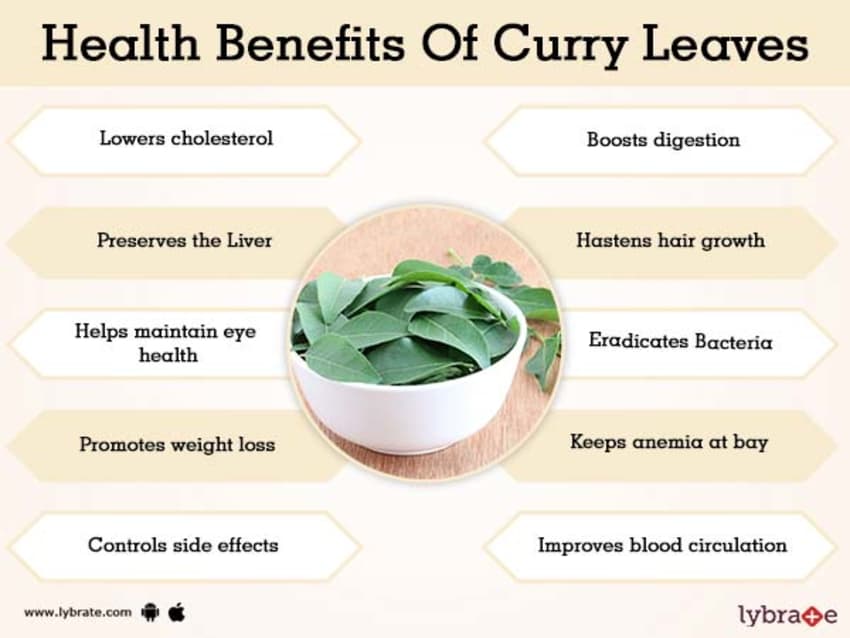Curry leaves or murraya koenigii, sometimes also known as sweet neem is used predominantly in Indian cuisine. The leaves’ aroma and flavor are ideal to be added to curries, meat dishes, vegetables as well as chutneys. But that is not all, as research has found that curry leaves are a superfood with multitude of benefits for the human body. Luckily, there are many ways to include curry leaves into your diet for effective results.
Benefits of Curry Leaves

Source: Lybrate.com
Lowering Cholesterol Level:
Curry leaves have properties which help lower one’s blood cholesterol levels. As it is packed with antioxidants, it prevents cholesterol oxidation that produces LDL cholesterol (bad cholesterol). This meant that it raises the amount of good cholesterol (HDL) and protects from atherosclerosis and heart disease.
Boosts Digestive System:
The digestive system is also one that is affected when ingesting curry leaves. Ayurveda believes that kadi patta has mild laxative properties which help the stomach get rid of unnecessary waste.
Liver Functions:
Research on curry leaf suggests that it contains strong hepato-protective properties of the tannins and carbazole alkaloids. When combined with vitamin A and vitamin C, it produces a highly powerful anti-oxidative property that not only prevents but also activates the organ to function more effectively.
Takes Care of Hair Health:
Your hair benefits greatly from ingesting curry leaves on a regular basis. It is said to adding bounce to limp hair, reinforcing the thin hair shaft, and falling hair. Dandruff is something that it can help get rid of, for the leaf extract has demonstrated antifungal activity against fungal scalp infection of Malassezia furfur.
Helps Eye Health:
Due to curry leaves which are abundant in carotenoid-containing vitamin A, it reduces the possibility of damage to the cornea. On the other hand, deficiency of vitamin A can cause eye disorders, including night blindness, vision loss, and cloud formation. Therefore, the leaves keep the retina safe and protect against loss of vision.
Eradicates Bacteria:
In today’s world, where the occurrence of antibiotic-resistant strains is rising rapidly, there are alternative infection therapies which are a necessity. This is where curry leaves come in to play. Carbazole alkaloids, compounds that contain antioxidant, antibacterial, and anti-inflammatory properties, are laden in curry leaves. The compound linalool present in curry leaves are also capable of destroying bacteria and cell-damaging free radicals.
Promotes Weight Loss:
Amongst its benefits, weight loss is also one of the effects of curry leaves. It is one of the best remedies to get rid of the body’s assembled fat. This is because studies show that curry leaves can help reduce the number of triglycerides and cholesterol, which helps prevent obesity.
Controls side effects:
If you are receiving chemotherapy and radiotherapy, curry leaves will help with the side effects. Other than that, it also protects against chromosomal damage and helps with bone marrow protection.
Improves Blood Circulation:
One with blood circulation problems should definitely try curry leaves to heal. This is because according to research, curry leaves helps to resolve menstrual issues, gonorrhea, diarrhea and alleviate aches.
Has Anti Diabetic Properties:
Regulating diabetes is also one of curry leaves’ greatest health effect. By using curry leaves in one’s diet, insulin-producing pancreatic cells can be stimulated and covered.
Treats Wounds:
Externally, you are able to apply curry leaves paste on wounds, rashes, boils, and mild burns for a curative effect. The paste also helps prevent and eliminate any type of harmful infection.
Dosage of curry leaves:
Curry leaves Powder – ¼-½ teaspoon twice a day.
Curry leaves Capsule – 1-2 capsules twice a day.
You can include curry leaves into your regular diet by adding 8-10 leaves to your vegetable juice. Or you can also dry the leaves and grind them to a fine powder and store in an airtight jar. Pregnant women who experience with morning sickness and nausea can eat one teaspoon every day, while those who suffer from flatulence can add half a teaspoon of the curry leaf powder to buttermilk to get relief.
Curry Leaves in Ayurveda and Supplements:
Curry leaves are mentioned in Ayurveda as Girinimba or Krishnanimba, named in several ancient scriptures after Lord Krishna, the God of Protection. In this traditional holistic healing, curry leaf essential oil is commonly used for the treatment of hair and skin issues, diabetes, eye problems, dental problems, diarrhea and many more.
Tikta (bitter) and Kashaya (astringent) properties are present in the curry leaves. With all the tribunals, i.e., it’s blessed Tikshna and Laghu (light), Rukhsha(dry) (sharp). It has Ushna Virya and Katu Vipaka (hot potency) (pungent metabolic property). It aggravates the doshas (digestion) of Pitta and pacifies the doshas of Vata (air) and Kapha (earth and water).





